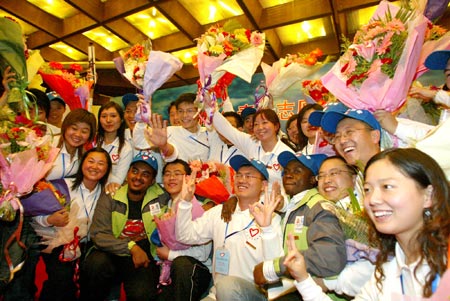The year 2006 was splendid for China's relations with neighboring countries and in its multilateral diplomacy. China's foreign policy toward neighboring countries is to build good relations and partnership with them and to secure an amicable, tranquil and prosperous neighborhood. In addition to successfully hosting the Shanghai Cooperation Organization (SCO) summit and the commemorative summit between China and the Association of Southeast Asian Nations (ASEAN), President Hu put forth the concept of "harmonious region" and "harmonious Asia" in 2006. China's relations with neighboring countries have been getting closer. Through hosting a phenomenal number of diplomatic events, China is playing an increasingly active role in international affairs.
Relations With Neighboring Countries
In November 2006, President Hu paid state visits to Viet Nam, Laos, India and Pakistan, strengthening China's friendly relations with the four neighbors. The first tour by a Chinese president to India in the past decade, Hu's visit marked a breakthrough in bilateral ties. After meeting with Indian Prime Minister Manmohan Singh, Hu stated that China and India should develop jointly following a win-win strategy. The two countries issued a joint statement, noting that an early settlement of their border disputes would be beneficial to both countries. The Chinese president's visit to Pakistan was a highlight in bilateral ties. Before President Hu left Pakistan, the two countries released a joint statement. In the statement, the Chinese side expressed that it will continue to cultivate bilateral ties out of strategic and long-term consideration; while the Pakistani side emphasized that relations with China are the cornerstone of the country's foreign policy.
The good neighborly foreign policy of China not only promotes mutual political trust and trade and economic cooperation between China and its neighboring countries, but also facilitates their joint initiatives in fighting against terrorism, drug trafficking as well as transnational crimes, as well as strengthens their cooperation in maritime safety, disease control and disaster mitigation. The good neighborly foreign policy has created a favorable climate for China's economic development and promoted world peace and development.
Multilateral Diplomacy
In late May 2006, the Second Ministerial Conference of the China-Arab Cooperation Forum was held in Beijing, which strengthened the friendship between China and Arabian countries and deepened bilateral cooperation.
 |
Participants in the Ethiopian Project for the Chinese Youth Volunteers Association pose for a group picture before they departed for the East African country.
On June 15, the annual summit meeting of the SCO was convened in Shanghai. This summit was a milestone for regional organization as the year 2006 marked the fifth anniversary of the SCO and the 10th anniversary of the "Shanghai Five" model. This summit clearly defined the role and direction of the SCO. Participants to the summit reached broad consensus on organizational structure, security issues and economic cooperation.
On October 30, 2006, the China-ASEAN Commemorative Summit marking the 15th anniversary of dialogue relations between China and ASEAN opened in Nanning, south China's Guangxi Zhuang Autonomous Region. China and ASEAN decided to set up the China-ASEAN Free Trade Area by 2010. Trade in goods between China and the six original members of ASEAN will be tariff free as of 2010, while trade between China and Cambodia, Laos, Myanmar and Viet Nam will be tariff free as of 2015. In the opening address, Premier Wen said that relations between China and ASEAN were at the best stage throughout the history, and the two sides had greatly enhanced mutual political trust, conducted fruitful trade and economic cooperation, made steady progress in building a free trade area and expanded exchanges and cooperation in all fields.
In 2006, the North Korean nuclear issue continued to be the focus of attention. After the nuclear test in North Korea in October, the UN Security Council unanimously passed a resolution, condemning the practice and imposing sanctions against Pyongyang. Due to the active mediation of China, the six-party talks on North Korean nuclear issue that had been stalled for more than a year resumed in Beijing on December 18, 2006. On February 8 to 13, 2007, China, North Korea, the United States, South Korea, Russia and Japan sat together in Beijing for the third session of the fifth round of the six-party talks. At the meeting, negotiators signed the first document for the implementation of the declaration reached on September 19, 2005. North Korea agreed to give up its nuclear programs in exchange for economic assistance and security assurances. On March 19, 2007, the first session of the sixth round of the six-party talks was held in Beijing. China has played an active role in pushing for a solution to the Korean nuclear issue through the six-party talks.
At the 14th APEC Economic Leaders' Meeting held in Viet Nam in November 2006, President Hu voiced China's wish to work with other countries to create a harmonious Asia. The Forum on China-Africa Cooperation Beijing Summit held in November was a success in China's multilateral diplomacy.








